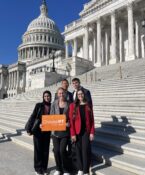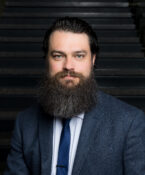Hope to erase the blurry vision of age
| Ever held a newspaper at arm’s length to read the fine print?
Then you might benefit from the development of eye drops that literally could change the way some 100 million Americans see. The drops were developed by Encore Vision with support from the Tech Fort Worth-UNT Health Science Center Accelerator Lab. They treat presbyopia, a condition that causes blurry near vision as people age. "Right now there is no medical treatment for presbyopia, just glasses or surgery," said Bill Burns, Encore Vision President and CEO. "And presbyopia is a condition that virtually everyone over 45 experiences." The eye drops work by reducing stiffness in the eye lens that occurs with aging. By restoring flexibility, the drops allow the lens to thicken in the center, making it easier to focus on nearby objects. "The drops are made from natural agents found in the body," Burns said. "So the body doesn’t have to figure out how to metabolize them, a key safety feature." Burns turned to the TechFW-UNTHSC Accelerator Lab for help in the early stages of development. Having access to lab space, equipment and other facilities was a real benefit, he said. "The resources available at the Accelerator Lab have proven to be an enormous asset to a start-up company like ours," he said. "The easy access to the vast treasure trove of publications, data and research was truly essential." "Encore Vision was the right kind of company for the partnership represented by the TechFW-UNTHSC Accelerator Lab," said Joe Allred, Associate Vice President for Research and Innovation. "TechFW staff helped Bill put together a business model that would work, coached him on presenting a business that would interest the right investors, then put him in front of our Cowtown Angel Network," she said. Encore Vision expects to move to human clinical trials by early next year. The therapeutic dosage has not been established, but Burns said the clinical program will help them determine dosing frequency and duration of treatment. "Our intent is by using these drops daily, people can eliminate entirely or at least reduce their dependency on readers," he said. |





Social media